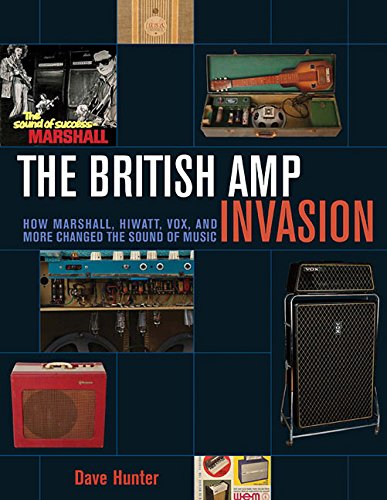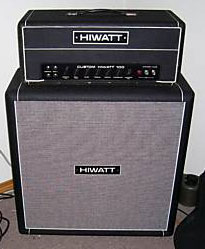 Dave Hunter’s latest book is entitled, The British Amp Invasion: How Marshall, Hiwatt, Vox, and More Changed the Sound of Music, and covers a span of the influence of British amplification from the late 1950s onward. As an industry, the companies behind the amplifiers are a fascinating study, not only from a design and sonic perspective, but also because of the stories themselves that surround their business success and growth (or for some, their bad deals and decline).
Dave Hunter’s latest book is entitled, The British Amp Invasion: How Marshall, Hiwatt, Vox, and More Changed the Sound of Music, and covers a span of the influence of British amplification from the late 1950s onward. As an industry, the companies behind the amplifiers are a fascinating study, not only from a design and sonic perspective, but also because of the stories themselves that surround their business success and growth (or for some, their bad deals and decline).
Continue reading
Tag Archives: hiwatt
The Hiwatt Custom 100 DR103
 When Marshall amplifiers became wildly popular on the music scene in the mid 60’s, clone and copy makers soon followed with their own versions of the famous Marshall Super Lead design. It needs to be noted that Hiwatt was NOT one of these companies. In fact, what may appear at first as a simple variation and copy on the Marshall SuperLead in what was the form of the Hiwatt Custom 100 DR103 head, further examination quickly reveals that the design itself was actually far from it.
When Marshall amplifiers became wildly popular on the music scene in the mid 60’s, clone and copy makers soon followed with their own versions of the famous Marshall Super Lead design. It needs to be noted that Hiwatt was NOT one of these companies. In fact, what may appear at first as a simple variation and copy on the Marshall SuperLead in what was the form of the Hiwatt Custom 100 DR103 head, further examination quickly reveals that the design itself was actually far from it.
Continue reading
Hiwatt Reissue Custom Shop 4×12 Cabinet & Weber Thames Speakers: Learning About the Hiwatt Fane Sound
A Brief Early History
As Marshall quickly grew in reputation as the new king of high-powered guitar amplification during the early 1960’s, Dave Reeves, who had been an employee of Mullard as well as a contractor for Sound City in London, began working on his own amplifiers that aimed to take the amplification construction quality and tonal designs to new heights. Reeve’s new Hiwatt amplifiers were born via his company, Hylight Electronics.
Continue reading
THD Electronics Hot Plate Attenuator
It’s not a secret that nothing beats the sound of a great guitar tube amp cranked up. When a tube amp is driven to overdrive, rich and musical even-ordered harmonics flow in abundance and the amplifier seems to take on a new sense of dynamic character that responds better to a player’s touch. It is this feel that gives a tube amp an organic and natural sense, while solid-state amplifiers are considered more sterile in sound because of the lack of this response or harmonics.
The age-old problem has been getting the great tube amp sound at lower and more realistic levels. As the majority of musicians play relatively small clubs and in even smaller practice rooms, only the minority (i.e. those famous guitarists!) get the real opportunity to play these tube amps at the volumes that they sound best. As a result, many of our classic and much beloved Marshall, Fender, and Vox amplifiers are often seen used with distortion and fuzz boxes to compensate. While my personal belief is that these distortion and fuzz boxes are useful in some applications, they are certainly not the best way to achieve great tone when used strictly as the sole source of distortion.
Continue reading
Vintage vs. Reissue Gear: Decisions, Decisions…
During the past few years, there has been a resurgence in the interest of vintage gear of all types, not only guitars and amplifiers, but even effect pedals. In the case of effect pedals, this is a most interesting phenomenon because during the ‘80s, when digital state-of-the-art rack systems were in vogue, effect pedals were basically considered “old junk.” Regardless, with so much interest in the market for vintage tones and gear, it was a no-brainer for companies to seek to fulfill the demand by creating reissues. And of course, like anything else, some of these recreations were built more accurately and better than others.
Continue reading